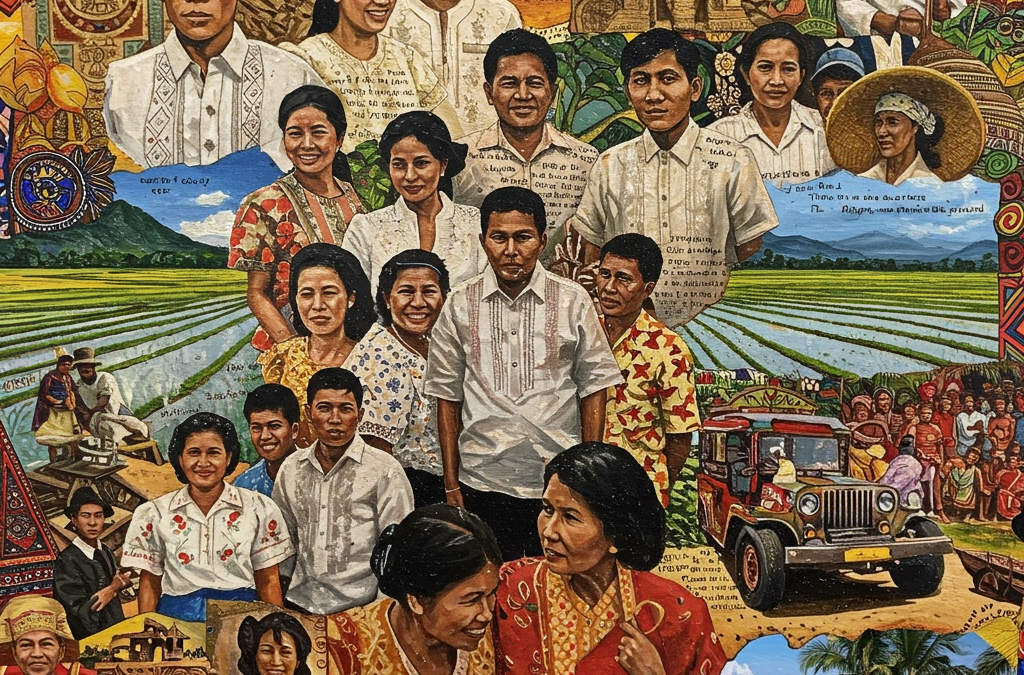What does it truly mean to carry the identity of Filipino in the dynamic landscape of the 21st century? It is a question without a single, simple answer, for being Filipino is not merely a matter of birth or lineage. It is a lived experience, a feeling in the heart, a connection to a rich history, and a constant negotiation between enduring tradition and the demands of modern life, whether on the islands or across the vast expanse of the global diaspora.
At its core, Filipino identity is anchored in fundamental values that have withstood centuries of change and challenge. The concept of family, for instance, extends far beyond the nuclear unit, encompassing grandparents, aunts, uncles, cousins, and even close friends and neighbors who are embraced like kin. This deep, often fierce, loyalty to family forms a vital support system, a source of strength in times of hardship, and a central pillar of daily life. It is a warmth and interconnectedness that defines interactions and obligations, shaping individual decisions in profound ways.
Intertwined with familial bonds is the spirit of Bayanihan and Kapwa. Bayanihan, traditionally the communal act of helping a neighbor, like moving a house, has evolved into a broader sense of community cooperation and mutual aid. Kapwa, often translated as “shared inner self” or “togetherness,” speaks to a fundamental recognition of humanity in others, fostering empathy and a sense of collective responsibility. These values create a sense of belonging and solidarity, binding Filipinos together across diverse backgrounds and geographic distances, particularly evident in how communities mobilize to support one another in times of crisis or celebration.
Perhaps the most defining trait of the Filipino spirit is an almost legendary resilience. Shaped by a history marked by colonization, political upheaval, economic fluctuations, and the frequent fury of nature, Filipinos have developed an extraordinary capacity to endure and rebuild. This resilience is not grim perseverance but is often accompanied by a remarkable ability to find joy, humor, and hope even in the darkest moments. It is the smile offered through adversity, the laughter shared amidst difficulty, that speaks volumes about an inner fortitude and an optimistic outlook on life. While some might view the often-cited phrase “Bahala Na” (roughly, “whatever happens, happens”) as fatalistic, others see it as an expression of adaptability – confronting a situation head-on after preparation, trusting in providence, and dealing with outcomes as they arise.
The tapestry of Filipino culture is incredibly rich and complex, a vibrant blend of indigenous heritage, layered with centuries of Spanish, American, and other Asian influences. This fusion is visible in everything from the more than 180 languages spoken across the archipelago to the diverse and flavorful cuisine that reflects regional ingredients and historical interactions. It is celebrated in the colorful fiestas honoring patron saints, the warmth of Filipino hospitality that makes strangers feel like family, and the artistic expressions that draw from a multifaceted past. To be Filipino is to be part of this living, breathing culture, constantly evolving yet deeply rooted.
For Filipinos in the diaspora, the question of identity can take on different dimensions. Growing up away from the homeland, particularly for second or third generations, often involves a journey of discovery and connection. It might mean actively seeking out cultural ties that were not always central to daily life, learning the language spoken by parents or grandparents, engaging with Filipino community groups, or finding ways to bridge cultural understandings between their heritage and the country they call home. It is a testament to the enduring draw of Filipino identity that individuals, even generations removed from the islands, feel a strong pull to connect with their roots, finding pride and belonging in the shared culture and history. Their experiences add new layers to what it means to be Filipino, demonstrating that identity is not static but can be actively claimed and celebrated.
This sense of identity is also deeply intertwined with patriotism and a love for the Philippines, whether one resides there or abroad. It is seen in the contributions of overseas Filipino workers, often hailed as modern-day heroes for their sacrifices, and in the dedication of those who work within the country to build a better future. Remembering national heroes like José Rizal and Apolinario Mabini, who fought for freedom and articulated a vision for the nation, remains a source of inspiration, reminding Filipinos of the cost of sovereignty and the importance of standing together for the nation’s welfare.
In contemporary life, Filipinos navigate a world influenced by global trends, digital connectivity, and ongoing social and political challenges. Yet, the core values of family, community, resilience, and hospitality persist, adapting to new contexts. The strong work ethic, often noted in professional settings like the BPO industry, is fueled by a sense of responsibility towards family. The ability to be bilingual or even multilingual (speaking Filipino, English, and perhaps a regional language) reflects historical influences and practical adaptability in a globalized world. Faith and religion continue to play significant roles for many, providing moral grounding and community connection.
Ultimately, being Filipino today is about embracing this complex, dynamic, and deeply felt identity. It is about honoring the traditions that ground us while adapting to the modern world. It is about the resilience to face hardship with a smile, the warmth to welcome others with open hearts, and the unwavering connection to family and fellow Filipinos, wherever they may be. It is a shared legacy of courage, culture, and compassion – an identity that is constantly being lived, shaped, and celebrated by millions around the globe. It is, in its most emotional sense, carrying a piece of the islands and its people within you, a source of pride and strength in every step of the journey.


Recent Comments